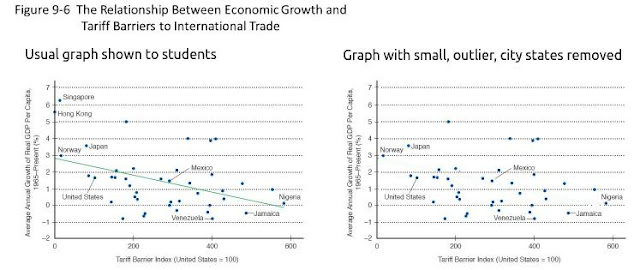The argument about whether tariffs are a good or a bad idea is an argument between Multinational Corporations and Nation States. Multinationals cannot see any benefit for themselves from tariffs, border controls and customs duties. National governments often maintain that they can protect their national industries with tariffs, multinational corporations argue that any protection is illusory.
The most prevalent graphic used in this debate allegedly shows a measure of national income - growth in gdp - declining as tariffs increase:
We can see that the line on the graph is just a political statement because it is obvious that there is almost no relationship between tariffs and economic growth. This is actually surprising because we might have expected at least some relationship between tariffs and growth. However, the lack of correlation between growth and tariffs does reinforce the equally surprising lack of correlation between International Trade Volume and national prosperity for countries with over $10,000 per capita income:
The explanation of this lack of correlation between international trade and prosperity is that when countries do not trade internationally they produce the missing goods at home. Of course, essentials that are not available at home must be acquired from abroad which is why countries must acquire these essentials before they are freed from the need for further international trade (ie: low growth happens at very low International Trade volumes because essentials like energy are missing from the economy).
The last time that the world had a regime of low tariffs and deregulation was in the 1920s, a boom occurred followed by a slump. During the slump there were small tariff increases relative to the 1920s but tariffs remained fairly low by historical standards. The much vaunted "high tariffs caused the slump" is simply untrue, indeed it could be argued that the slump was in fact due to low tariffs if we had not already seen above that tariffs probably had little to do with events (hint: it was the international bankers caused both the 30's slump and the recent recession).
"The tendency to greatly overstate the systematic evidence in favor of trade openness has had a substantial influence on policy around the world. Our concern is that the priority afforded to trade policy has generated expectations that are unlikely to be met, and it may have crowded out other institutional reforms with potentially greater payoffs." Trade Policy and Economic Growth: A Skeptic's Guide to the Cross-National Evidence
The huge problem facing economists and politicians when investigating the relationship between tariffs and growth is that much of the work is financed directly or indirectly by multinational companies whose agenda is No Tariffs.
The most prevalent graphic used in this debate allegedly shows a measure of national income - growth in gdp - declining as tariffs increase:
We can see that the line on the graph is just a political statement because it is obvious that there is almost no relationship between tariffs and economic growth. This is actually surprising because we might have expected at least some relationship between tariffs and growth. However, the lack of correlation between growth and tariffs does reinforce the equally surprising lack of correlation between International Trade Volume and national prosperity for countries with over $10,000 per capita income:
 |
| Notice Hong Kong and Singapore are outliers. |
The last time that the world had a regime of low tariffs and deregulation was in the 1920s, a boom occurred followed by a slump. During the slump there were small tariff increases relative to the 1920s but tariffs remained fairly low by historical standards. The much vaunted "high tariffs caused the slump" is simply untrue, indeed it could be argued that the slump was in fact due to low tariffs if we had not already seen above that tariffs probably had little to do with events (hint: it was the international bankers caused both the 30's slump and the recent recession).
"The tendency to greatly overstate the systematic evidence in favor of trade openness has had a substantial influence on policy around the world. Our concern is that the priority afforded to trade policy has generated expectations that are unlikely to be met, and it may have crowded out other institutional reforms with potentially greater payoffs." Trade Policy and Economic Growth: A Skeptic's Guide to the Cross-National Evidence
The huge problem facing economists and politicians when investigating the relationship between tariffs and growth is that much of the work is financed directly or indirectly by multinational companies whose agenda is No Tariffs.

Comments